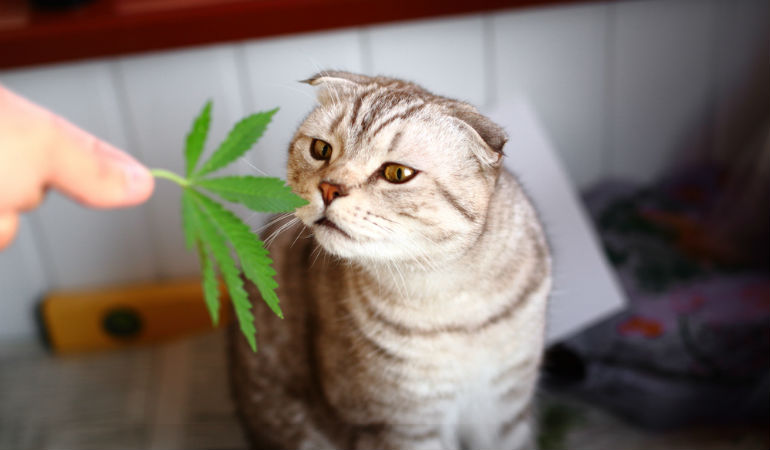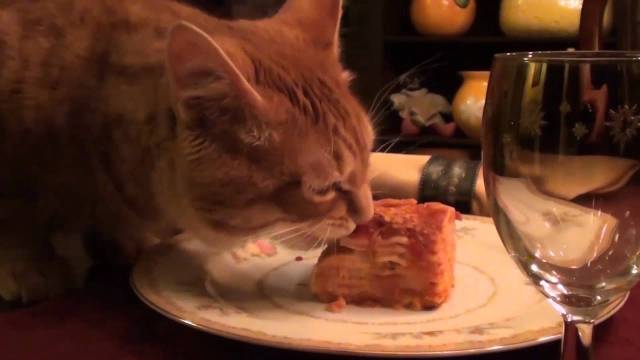
Connect with a verified veterinarian in minutes. Licensed vets are available 24/7 to answer your questions. No need to worry about your furry family member.
Some cats eat just about anything. If it’s something that smells or looks appealing to your cat, then they may give it a try. This is especially the cae if they see you enjoying something, they would like a part of it, too! So, it can sometimes happen that cats eat snacks that were not meant for them. This can even include edibles.
So, what happens if a cat eats an edible? Let’s explore what edibles are and how they can affect your pet.
Edibles & Catnip Share Some Commonalities
The term edible refers to a variety of food items that contain cannabis (also known as marijuana or weed), including baked goods, candies, chocolates, and drinks. People often make these as a discrete way to take cannabis.
But did you know that catnip and weed share some similarities? The fact is that catnip has a similar effect on cats as cannabis does on humans. Catnip contains a substance called nepetalactone, which is a stimulant that makes a cat high. It has a similar reaction on the cat’s brain as cannabis does on humans.
The chemicals in cannabis (THC & CBD) and nepetalactone in catnip act on certain receptors in parts of the brain that affect behavior and emotion. Cats, like us, have an endocannabinoid system (ECS) that regulates physiological systems in the body. These include the immune response, sleep, coordination, mood, appetite, and more.
The difference is that catnip is relatively safe for cats to eat and it would take a lot to make a cat unwell, whereas cannabis is at far lower doses.
When a cat has cannabis, you may notice these symptoms:
- Lack of coordination
- Diarrhea
- Drooling
- Aggressive behavior
- Acting withdrawn
- Swaying, wobbly on legs, awkward gait
- Vomiting
- Seizures
- Irregular heartbeat
- Shivering
If you notice these symptoms in your cat, call the vet immediately. This could be a life-threatening medical emergency. And don’t worry about the vet turning you in if the cannabis is illegal where you live. Veterinarians are not required to call the police. The life of your cat could be in danger, and she needs to receive treatment as soon as possible.
Treatment of Marijuana Intoxication in Cats
The vet will start by performing a physical exam on your cat. They will also run lab work and may induce vomiting if the cat has recently ingested in the cannabis. This will prevent more of the substance from being absorbed through the cat’s digestive system.
In some cases, the vet may need to pump your kitty’s stomach out and give her activated charcoal every 6-8 hours to neutralize any remaining cannabis. In addition, your cat may require supportive care such as IV fluids, monitoring and regulating of her heart, breathing and body temperature. She may also need to be confined in a comfortable space where she can’t hurt herself if she’s having trouble with coordination, etc.
In most cases, the prognosis is very good for cats who have eaten cannabis if they have received prompt medical care.
Connect with a verified veterinarian in minutes. Licensed vets are available 24/7 to answer your questions. No need to worry about your furry family member.

Rebecca MacMillan, BVetMed BSAVA PGCertSAM MRCVS
This article has been reviewed and approved by an independent Veterinarian: Rebecca is a companion animal vet who has always had a passion for writing and client communication. Since her graduation from the Royal Veterinary college in 2009 she has gained a wealth of experience in first opinion small animal practice, in both clinical and managerial roles. She currently works in the South West and deals with a variety of routine and emergency appointments, but particularly enjoys medicine cases. Outside of work and writing, she enjoys spending time with her family, including her bouncy flat coated retriever George!
Review symptoms, medications & behavior to keep your pets healthy with a Vet Online in just minutes.
Ask a Vet Live Now




